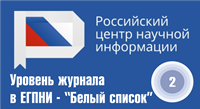АССОЦИАЦИЯ ПРОБЛЕМНОГО ИСПОЛЬЗОВАНИЯ СОЦИАЛЬНЫХ СЕТЕЙ С ПОКАЗАТЕЛЯМИ ДЕПРЕССИИ ПО ШКАЛЕ HADS У СТУДЕНТОВ МЕДИЦИНСКОГО УНИВЕРСИТЕТА
Аннотация
Имеющиеся литературные данные о влиянии социальных сетей на психическое здоровье противоречивы. В одних исследованиях сообщается о пользе использования социальных сетей для психического здоровья, включая усиление социальной поддержки, укрепление связей и поиск помощи. В других, наоборот, были выявлены ассоциации проблемного использования социальных сетей с рядом психосоциальных проблем, такими как психологический стресс, тревога и депрессия.
Цель. Изучить ассоциацию проблемного использования социальных сетей с показателями депрессии по шкале HADS у студентов медицинского университета.
Материалы и методы. Обследовано 229 студентов обоего пола, обучающихся на 3 курсе лечебного факультета медицинского университета. Проблемное использования социальных сетей выявляли, используя русскоязычную версию опросника «The Social Media Disorder Scale». Выявление депрессивных расстройств и оценку степени тяжести осуществляли с использованием русскоязычной версии госпитальной шкалы тревоги и депрессии HADS.
Результаты. Установлено, что признаки депрессии отмечались у 34,9% обследованных студентов и среди девушек встречались статистически значимо чаще в сравнении с юношами. Частота проблемного использования социальных сетей среди студентов, имеющих признаки депрессии, составила 36,4%. Как среди обследованных девушек, так и среди юношей количество лиц, имеющих признаки депрессии в сочетании с проблемным использованием социальных сетей, было более чем в два раза выше по сравнению с пациентами без проблемного использования социальных сетей.
Заключение. Выявлены ассоциации проблемного использования социальных сетей с показателями депрессии по шкале HADS среди студентов, обучающихся в медицинском университете.
Скачивания
Литература
Список литературы
Деревянных Е.В., Балашова Н.А., Яскевич Р.А., Москаленко О.Л. Частота и выраженность тревожно-депрессивных нарушений у студентов медицинского вуза // В мире научных открытий. 2017. Т. 9, № 1. С. 10-28. https://doi.org/10.12731/wsd-2017-1-10-28
Зотова Д.В., Розанов В.А. Патологическое использование и зависимость от социальных сетей - анализ с позиций феноменологии аддиктивного поведения // Вестник Санкт-Петербургского университета. Психология. 2020. Т. 10. Вып. 2. С. 158-183. https://doi.org/10.21638/spbu16.2020.204
Игнатова И.А., Яскевич Р.А., Шилов С.Н., Покидышева Л.И. Показатели качества жизни у слабослышащих мигрантов Крайнего Севера в период реадаптации к новым климатическим условиям // Российская оториноларингология. 2013. № 6 (67). С. 66-71.
Москаленко О.Л., Терещенко С.Ю., Яскевич Р.А. Влияние интернет-аддикции на показатели депрессии у студентов медицинского вуза // Russian Journal of Education and Psychology. 2022. Т.13, № 5. С. 118-135. https://doi.org/10.12731/2658-4034-2022-13-4-133-150
Москаленко О.Л., Яскевич Р.А. Тревожно-депрессивные расстройства у жителей Крайнего Севера и Сибири // Russian Journal of Education and Psychology. 2021. Т. 12, № 3-2. С. 113-119. https://doi.org/10.12731/2658-4034-2021-12-3-2-113-119
Москаленко О.Л., Яскевич Р.А. Тревожно-депрессивные расстройства у пациентов с артериальной гипертонией (обзор литературы) // Russian Journal of Education and Psychology. 2021. Т. 12, № 1-2. С. 185-190. https://doi.org/10.12731/2658-4034-2021-12-1-2-185-190
Попов В.И., Милушкина О.Ю., Скоблина Н.А. и др. Влияние использования социальных сетей на формирование интернет-зависимостей у студентов-медиков // Здоровье населения и среда обитания. 2022. Т. 30. № 8. С. 51–56. https://doi.org/10.35627/2219-5238/2022-30-8-51-56
Яскевич Н.А., Лычаков А.С., Яскевич Р.А., Москаленко О.Л. Оценка роли хронобиологического типа личности в формировании интернет-аддиктивного поведения у школьников // Russian Journal of Education and Psychology. 2023. Т.14, № 1. С. 173-193. https://doi.org/10.12731/2658-4034-2023-14-1-173-193
Яскевич Н.А., Рыбин Е.А., Яскевич Р.А., Москаленко О.Л. Оценка взаимосвязи интернет-аддиктивного поведения и клипового мышления у школьников // Russian Journal of Education and Psychology. 2023. Т. 14, №2. С. 121-141. https://doi.org/10.12731/2658-4034-2023-14-2-121-141
Яскевич Р.А., Игнатова И.А., Шилов С.Н. и др. Влияние тревожно-депрессивных расстройств на качество жизни слабослышащих мигрантов Крайнего Севера в период реадаптации к новым климатическим условиям // Современные проблемы науки и образования. 2014. № 4. С. 279.
Яскевич Р.А., Каспаров Э.В., Гоголашвили Н.Г. Расстройства депрессивного характера при метаболическом синдроме у мигрантов Крайнего Севера с артериальной гипертонией // Сибирский научный медицинский журнал. 2023. Т. 43. № 4. С. 123-131. https://doi.org/10.18699/SSMJ20230413
Яскевич Р.А., Кочергина К.Н., Каспаров Э.В. Влияние выраженности тревожно-депрессивных расстройств на качество жизни больных артериальной гипертонией // Siberian Journal of Life Sciences and Agriculture. 2019. Т. 11, № 5-2. С. 146-151. https://doi.org/10.12731/2658-6649-2019-11-5-2-146-151
Яскевич Р.А., Москаленко О.Л. Аффективные расстройства у женщин, имеющих хроническую ишемическую болезнь сердца в сочетании с метаболическим синдромом // Siberian Journal of Life Sciences and Agriculture. 2023. Т. 15. № 2. С. 284-302. https://doi.org/10.12731/2658-6649-2023-15-3-254-278
Яскевич Р.А., Москаленко О.Л. Аффективные расстройства у мужчин, имеющих хроническую ишемическую болезнь сердца в сочетании с метаболическим синдромом // Siberian Journal of Life Sciences and Agriculture. 2023. Т. 15. № 1. С. 327-345. https://doi.org/10.12731/2658-6649-2023-15-1-327-345
Alfaya M.A., Abdullah N.S., Alshahrani N.Z. et al. Prevalence and Determinants of Social Media Addiction among Medical Students in a Selected University in Saudi Arabia: A Cross-Sectional Study // Healthcare (Basel), 2023, no. 11(10), p. 1370. https://doi.org/10.3390/healthcare11101370
Cheng C., Ebrahimi O.V., Luk J.W. Heterogeneity of Prevalence of Social Media Addiction Across Multiple Classification Schemes: Latent Profile Analysis // J. Med. Internet. Res., 2022, no. 24(1), p. e27000. https://doi.org/10.2196/27000
Cheng C., Lau Y., Chan L., Luk J.W. Prevalence of social media addiction across 32 nations: Meta-analysis with subgroup analysis of classification schemes and cultural values // Addict. Behav., 2021, no. 117, p. 106845. https://doi.org/10.1016/j.addbeh.2021.106845
Digital 2023: Global Overview Report. Global Digital Insights. 2023. URL: https://datareportal.com/reports/digital-2023-global-overview-report (accessed 15.12.2023).
Huang C.A. Meta-analysis of the problematic social media use and mental health // Int. J. Soc. Psychiatry, 2022, no. 68(1), pp. 12-33. https://doi.org/10.1177/0020764020978434
Hussain Z., Wegmann E., Yang H., Montag C. Social networks use disorder and associations with depression and anxiety symptoms: a systematic review of recent research in China // Front Psychol., 2020, no. 11, p. 211. https://doi.org/10.3389/fpsyg.2020.00211
Lai A.Y., Yeung W.F. Editorial: Mental health of higher education students // Front Psychiatry, 2022, vol. 13, p. 1089877. https://doi.org/10.3389/fpsyt.2022.1089877
Lee M.H.L., Kaur M., Shaker V. et al. Cyberbullying, Social Media Addiction and Associations with Depression, Anxiety, and Stress among Medical Students in Malaysia // Int. J. Environ. Res. Public. Health, 2023, no. 20(4), p. 3136. https://doi.org/10.3390/ijerph20043136
Lin S., Liu D., Niu G., Longobardi C. Active social network sites use and loneliness: the mediating role of social support and self-esteem // Curr. Psychol., 2020, no. 41(3), pp. 1279-1286. https://doi.org/10.1007/s12144-020-00658-8
Mao Y., Zhang N., Liu J. et al. A systematic review of depression and anxiety in medical students in China // BMC Med. Educ, 2019, no. 19(1), p. 327. https://doi.org/10.1186/s12909-019-1744-2
Meng S.Q., Cheng J.L., Li Y.Y. et al., Global prevalence of digital addiction in general population: a systematic review and meta-analysis // Clin Psychol Rev., 2022, no. 92, p. 102128. https://doi.org/10.1016/j.cpr.2022.102128.S0272-7358(22)00013-7
Olum R., Nakwagala F.N., Odokonyero R. Prevalence and Factors Associated with Depression among Medical Students at Makerere University, Uganda // Adv. Med. Edu.c Pract., 2020, no. 11, pp. 853-860. https://doi.org/10.2147/AMEP.S278841
Pellegrino A, Stasi A, Bhatiasevi V. Research trends in social media addiction and problematic social media use: A bibliometric analysis // Front Psychiatry., 2022, no. 13, p. 1017506. https://doi.org/10.3389/fpsyt.2022.1017506
Plackett R., Sheringham J., Dykxhoorn J. The Longitudinal Impact of Social Media Use on UK Adolescents' Mental Health: Longitudinal Observational Study // J. Med. Internet. Res., 2023, no. 25, p. e43213. https://doi.org/10.2196/43213
Sayili U., Pirdal B.Z., Kara B. et al. Internet Addiction and Social Media Addiction in Medical Faculty Students: Prevalence, Related Factors, and Association with Life Satisfaction // J. Community Health, 2023, no. 48(2), pp. 189-198. https://doi.org/10.1007/s10900-022-01153-w
Shannon H., Bush K., Villeneuve P.J. et al. Problematic Social Media Use in Adolescents and Young Adults: Systematic Review and Meta-analysis // JMIR Ment Health, 2022, no. 9(4), p. e33450. https://doi.org/10.2196/33450
Sserunkuuma J., Kaggwa M.M., Muwanguzi M. et al. Problematic use of the internet, smartphones, and social media among medical students and relationship with depression: An exploratory study // PLoS One, 2023, no. 18(5), p. e0286424. https://doi.org/10.1371/journal.pone.0286424
Tereshchenko S.Y. Neurobiological risk factors for problematic social media use as a specific form of Internet addiction: A narrative review // World. J. Psychiatry, 2023, no. 13(5), pp. 160-173. https://doi.org/10.5498/wjp.v13.i5.160
Van Den Eijnden R.J.J.M., Lemmens J.S., Valkenburg P.M. The social media disorder scale // Comput. Hum. Behav., 2016, no. 61, pp. 478-487. https://doi.org/10.1016/j.chb.2016.03.038
Xiao W., Peng J., Liao S. Exploring the Associations between Social Media Addiction and Depression: Attentional Bias as a Mediator and Socio-Emotional Competence as a Moderator // Int. J. Environ. Res. Public. Health, 2022, no. 19(20), p. 13496. https://doi.org/10.3390/ijerph192013496
Yigiter, M.S., Demir S., Dogan N. The Relationship Between Problematic Social Media Use and Depression: A Meta-Analysis Study // Curr. Psychol., 2023, https://doi.org/10.1007/s12144-023-04972-9
Zhao J., Jia T., Wang X. et al. Risk Factors Associated with Social Media Addiction: An Exploratory Study // Front. Psychol., 2022, no. 13, p. 1372. https://doi.org/10.3389/fpsyg.2022.837766
Zigmond A.S., Snaith R.P. The hospital anxiety and depression scale // Acta. Psychiatr. Scand., 1983, no. 67(6), pp. 361-70.
Žmavc M., Šorgo A., Gabrovec B. et al. The Protective Role of Resilience in the Development of Social Media Addiction in Tertiary Students and Psychometric Properties of the Slovenian Bergen Social Media Addiction Scale (BSMAS) // Int. J. Environ. Res. Public. Health, 2022, no. 19(20), p. 13178. https://doi.org/10.3390/ijerph192013178
References
Derevyannykh E.V., Balashova N.A., Yaskevich R.A., Moskalenko O.L. Chastota i vyrazhennost' trevozhno-depressivnykh narusheniy u studentov meditsinskogo vuza [Frequency and severity of anxiety-depressive disorders in medical students]. V mire nauchnykh otkrytiy [In the world of scientific discoveries], 2017, vol. 9, no. 1, pp. 10-28. https://doi.org/10.12731/wsd-2017-1-10-28
Zotova D.V., Rozanov V.A. Patologicheskoe ispol'zovanie i zavisimost' ot sotsial'nykh setey-analiz s pozitsiy fenomenologii addiktivnogo povedeniya [Pathological use and dependence on social networks - analysis from the standpoint of the phenomenology of addictive behavior]. Vestnik Sankt-Peterburgskogo universiteta. Psikhologiya [Bulletin of St. Petersburg University], 2020, vol. 10, no. 2, pp. 158-183. https://doi.org/10.21638/spbu16.2020.204
Ignatova I.A., Yaskevich R.A., Shilov S.N., Pokidysheva L.I. Pokazateli kachestva zhizni u slaboslyshashchikh migrantov Kraynego Severa v period readaptatsii k novym klimaticheskim usloviyam [Indicators of quality of life among hearing-impaired migrants of the Far North during the period of readaptation to new climatic conditions]. Rossiyskaya otorinolaringologiya [Russian Otorhinolaryngology], 2013, no. 6(67), pp. 66-71.
Moskalenko O.L., Tereshchenko S.Yu., Yaskevich R.A. Vliyanie internet-addiktsii na pokazateli depressii u studentov meditsinskogo vuza [The influence of Internet addiction on depression indicators in medical students] Russian Journal of Education and Psychology, 2022, vol. 13, no. 5, pp. 118-135. https://doi.org/10.12731/2658-4034-2022-13-4-133-150
Moskalenko O.L., Yaskevich R.A. Trevozhno-depressivnye rasstroystva u zhiteley Kraynego Severa i Sibiri [Anxiety and depressive disorders in residents of the Far North and Siberia]. Russian Journal of Education and Psychology, 2021, vol. 12, no. 3-2, pp. 113-119. https://doi.org/10.12731/2658-4034-2021-12-3-2-113-119
Moskalenko O.L., Yaskevich R.A. Trevozhno-depressivnye rasstroystva u patsientov s arterial'noy gipertoniey (obzor literatury) [Anxiety and depressive disorders in patients with arterial hypertension (literature review)]. Russian Journal of Education and Psychology, 2021, vol. 12, no. 1-2, pp. 185-190. https://doi.org/10.12731/2658-4034-2021-12-1-2-185-190
Popov V.I., Milushkina O.Yu., Skoblina N.A. i dr. Vliyanie ispol'zovaniya sotsial'nykh setey na formirovanie internet-zavisimostey u studentov-medikov [The influence of the use of social networks on the formation of Internet addiction among medical students]. Zdorov'e naseleniya i sreda obitaniya [Population health and habitat], 2022, vol. 30, no. 8, pp. 51-56. https://doi.org/10.35627/2219-5238/2022-30-8-51-56
Yaskevich N.A., Lychakov A.S., Yaskevich R.A., Moskalenko O.L. Otsenka roli khronobiologicheskogo tipa lichnosti v formirovanii internet-addiktivnogo povedeniya u shkol'nikov [Evaluation of the role of the chronobiological personality type in the formation of Internet addictive behavior in schoolchildren]. Russian Journal of Education and Psychology, 2023, vol. 14, no. 1, pp. 173-193. https://doi.org/10.12731/2658-4034-2023-14-1-173-193
Yaskevich N.A., Rybin E.A., Yaskevich R.A., Moskalenko O.L. Otsenka vzaimosvyazi internet-addiktivnogo povedeniya i klipovogo myshleniya u shkol'nikov [Evaluation of the relationship between Internet addictive behavior and clip thinking in schoolchildren]. Russian Journal of Education and Psychology, 2023, vol. 14, no. 2, pp. 121-141. https://doi.org/10.12731/2658-4034-2023-14-2-121-141
Yaskevich R.A., Ignatova I.A., Shilov S.N. et al. Vliyanie trevozhno-depressivnykh rasstroystv na kachestvo zhizni slaboslyshashchikh migrantov Kraynego Severa v period readaptatsii k novym klimaticheskim usloviyam [Influence of anxiety-depressive disorders on the quality of life of hearing-impaired migrants of the Far North during the period of readaptation to new climatic conditions]. Sovremennye problemy nauki i obrazovaniya [Modern problems of science and education], 2014, no. 4, p. 279.
Yaskevich R.A., Kasparov E.V., Gogolashvili N.G. Rasstroystva depressivnogo kharaktera pri metabolicheskom sindrome u migrantov Kraynego Severa s arterial'noy gipertoniey [Depressive disorders in metabolic syndrome among migrants of the Far North with arterial hypertension]. Sibirskiy nauchnyy meditsinskiy zhurnal [Siberian Scientific Medical Journal], 2023, vol. 43, no. 4, pp. 123-131. https://doi.org/10.18699/SSMJ20230413
Yaskevich R.A., Kochergina K.N., Kasparov E.V. Vliyanie vyrazhennosti trevozhno-depressivnykh rasstroystv na kachestvo zhizni bol'nykh arterial'noy gipertoniey [The influence of the severity of anxiety-depressive disorders on the quality of life of patients with arterial hypertension]. Siberian Journal of Life Sciences and Agriculture, 2019, vol. 11, no. 5-2, pp. 146-151. https://doi.org/10.12731/2658-6649-2019-11-5-2-146-151
Yaskevich R.A., Moskalenko O.L. Affektivnye rasstroystva u zhenshchin, imeyushchikh khronicheskuyu ishemicheskuyu bolezn' serdtsa v sochetanii s metabolicheskim sindromom [Affective disorders in women with chronic ischemic heart disease in combination with metabolic syndrome]. Siberian Journal of Life Sciences and Agricultur, 2023, vol. 15, no. 2, pp. 284-302. https://doi.org/10.12731/2658-6649-2023-15-3-254-278
Yaskevich R.A., Moskalenko O.L. Affektivnye rasstroystva u muzhchin, imeyushchikh khronicheskuyu ishemicheskuyu bolezn' serdtsa v sochetanii s metabolicheskim sindromom [Affective disorders in men with chronic ischemic heart disease in combination with metabolic syndrome]. Siberian Journal of Life Sciences and Agriculture, 2023, vol. 15, no. 1, pp. 327-345. https://doi.org/10.12731/2658-6649-2023-15-1-327-345
Alfaya M.A., Abdullah N.S., Alshahrani N.Z. et al. Prevalence and Determinants of Social Media Addiction among Medical Students in a Selected University in Saudi Arabia: A Cross-Sectional Study. Healthcare (Basel), 2023, no. 11(10), p. 1370. https://doi.org/10.3390/healthcare11101370
Cheng C., Ebrahimi O.V., Luk J.W. Heterogeneity of Prevalence of Social Media Addiction Across Multiple Classification Schemes: Latent Profile Analysis. J. Med. Internet. Res., 2022, no. 24(1), p. e27000. https://doi.org/10.2196/27000
Cheng C., Lau Y., Chan L., Luk J.W. Prevalence of social media addiction across 32 nations: Meta-analysis with subgroup analysis of classification schemes and cultural values. Addict. Behav., 2021, no. 117, p. 106845. https://doi.org/10.1016/j.addbeh.2021.106845
Digital 2023: Global Overview Report. Global Digital Insights. 2023. URL: https://datareportal.com/reports/digital-2023-global-overview-report (accessed 15.12.2023).
Huang C.A. Meta-analysis of the problematic social media use and mental health. Int. J. Soc. Psychiatry, 2022, no. 68(1), pp. 12-33. https://doi.org/10.1177/0020764020978434
Hussain Z., Wegmann E., Yang H., Montag C. Social networks use disorder and associations with depression and anxiety symptoms: a systematic review of recent research in China. Front Psychol., 2020, no. 11, p. 211. https://doi.org/10.3389/fpsyg.2020.00211
Lai A.Y., Yeung W.F. Editorial: Mental health of higher education students. Front Psychiatry, 2022, vol. 13, p. 1089877. https://doi.org/10.3389/fpsyt.2022.1089877
Lee M.H.L., Kaur M., Shaker V. et al. Cyberbullying, Social Media Addiction and Associations with Depression, Anxiety, and Stress among Medical Students in Malaysia. Int. J. Environ. Res. Public. Health, 2023, no. 20(4), p. 3136. https://doi.org/10.3390/ijerph20043136
Lin S., Liu D., Niu G., Longobardi C. Active social network sites use and loneliness: the mediating role of social support and self-esteem. Curr. Psychol., 2020, no. 41(3), pp. 1279-1286. doi: 10.1007/s12144-020-00658-8.
Mao Y., Zhang N., Liu J. et al. A systematic review of depression and anxiety in medical students in China. BMC Med. Educ, 2019, no. 19(1), p. 327. https://doi.org/10.1186/s12909-019-1744-2
Meng S.Q., Cheng J.L., Li Y.Y. et al. Global prevalence of digital addiction in general population: a systematic review and meta-analysis. Clin Psychol Rev., 2022, no. 92, p. 102128. https://doi.org/10.1016/j.cpr.2022.102128.S0272-7358(22)00013-7
Olum R., Nakwagala F.N., Odokonyero R. Prevalence and Factors Associated with Depression among Medical Students at Makerere University, Uganda. Adv. Med. Edu.c Pract., 2020, no. 11, pp. 853-860. https://doi.org/10.2147/AMEP.S278841
Pellegrino A, Stasi A, Bhatiasevi V. Research trends in social media addiction and problematic social media use: A bibliometric analysis. Front Psychiatry., 2022, no. 13, p. 1017506. https://doi.org/10.3389/fpsyt.2022.1017506
Plackett R., Sheringham J., Dykxhoorn J. The Longitudinal Impact of Social Media Use on UK Adolescents' Mental Health: Longitudinal Observational Study. J. Med. Internet. Res., 2023, no. 25, p. e43213. https://doi.org/10.2196/43213
Sayili U., Pirdal B.Z., Kara B. et al. Internet Addiction and Social Media Addiction in Medical Faculty Students: Prevalence, Related Factors, and Association with Life Satisfaction. J. Community Health, 2023, no. 48(2), pp. 189-198. https://doi.org/10.1007/s10900-022-01153-w
Shannon H., Bush K., Villeneuve P.J. et al. Problematic Social Media Use in Adolescents and Young Adults: Systematic Review and Meta-analysis. JMIR Ment Health, 2022, no. 9(4), p. e33450. https://doi.org/10.2196/33450
Sserunkuuma J., Kaggwa M.M., Muwanguzi M. et al. Problematic use of the internet, smartphones, and social media among medical students and relationship with depression: An exploratory study. PLoS One, 2023, no. 18(5), p. e0286424. https://doi.org/10.1371/journal.pone.0286424
Tereshchenko S.Y. Neurobiological risk factors for problematic social media use as a specific form of Internet addiction: A narrative review. World. J. Psychiatry, 2023, no. 13(5), pp. 160-173. https://doi.org/10.5498/wjp.v13.i5.160
Van Den Eijnden R.J.J.M., Lemmens J.S., Valkenburg P.M. The social media disorder scale. Comput. Hum. Behav., 2016, no. 61, pp. 478-487. https://doi.org/10.1016/j.chb.2016.03.038
Xiao W., Peng J., Liao S. Exploring the Associations between Social Media Addiction and Depression: Attentional Bias as a Mediator and Socio-Emotional Competence as a Moderator. Int. J. Environ. Res. Public. Health, 2022, no. 19(20), p. 13496. https://doi.org/10.3390/ijerph192013496
Yigiter, M.S., Demir S., Dogan N. The Relationship Between Problematic Social Media Use and Depression: A Meta-Analysis Study. Curr. Psychol., 2023, https://doi.org/10.1007/s12144-023-04972-9
Zhao J., Jia T., Wang X. et al. Risk Factors Associated with Social Media Addiction: An Exploratory Study. Front. Psychol., 2022, no. 13, p. 1372. https://doi.org/10.3389/fpsyg.2022.837766
Zigmond A.S., Snaith R.P. The hospital anxiety and depression scale. Acta. Psychiatr. Scand., 1983, no. 67(6), pp. 361-70.
Žmavc M., Šorgo A., Gabrovec B. et al. The Protective Role of Resilience in the Development of Social Media Addiction in Tertiary Students and Psychometric Properties of the Slovenian Bergen Social Media Addiction Scale (BSMAS). Int. J. Environ. Res. Public. Health, 2022, no. 19(20), p. 13178. https://doi.org/10.3390/ijerph192013178
Просмотров аннотации: 399
Copyright (c) 2024 Roman A. Yaskevich, Olga L. Moskalenko

Это произведение доступно по лицензии Creative Commons «Attribution-NonCommercial-NoDerivatives» («Атрибуция — Некоммерческое использование — Без производных произведений») 4.0 Всемирная.





































